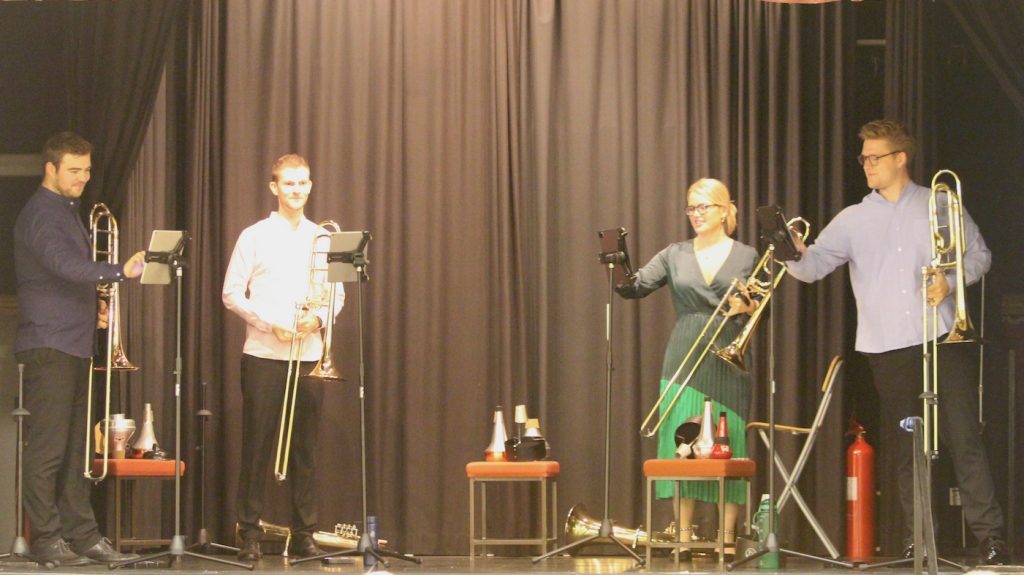
The history of the trombone quartet is not a long and illustrious one; no weighty Beethoven masterpieces, effervescent Mozart divertimenti or poignant Brahms rhapsodies to draw on, not even in the more adventurous twentieth-century are there many offerings for this sonorous and humorous collection of instruments. Of course, there are some of the usual suspects, including the ever-present Gordon Jacob (who must have enjoyed the challenge of writing for any collection of instruments), but no acerbic Stravinsky, witty Prokofiev or sensuous Ravel to draw on. With this in mind, the repertoire for the trombone quartet is something of a tabula rasa for an aspiring group – a programme has to be built on idiomatic arrangements and brand-new commissions to work – and that is exactly what the Bone-Afide Trombone Quartet provided for a full house at Kemnay Village Hall earlier this month.
Before the quartet even stepped on stage, there was a feeling that this concert was going to be good, or if not that, maybe appropriate – there was something fitting about seeing brass instruments on the stage of a Victorian village hall, a harking back to an earlier world of communal and amateur music making that must have reverberated around the walls for decades and decades. However, there was nothing amateur about the quartet as they launched into their first piece, an arrangement of Kodály’s own arrangement of the Hungarian folksong The Peacock which they delivered with poise and aplomb. If Kodály’s folksong seemed a natural fit for trombones, few would have imagined the next piece would work in any fashion, Liszt’s Hungarian Rhapsody No. 2, one of the composer’s most easily recognisable and pianistic works! But it did work! Stripping back the full textures of Liszt’s piano writing for the four voices of Bone-Afide must have been a Herculean task for the arranger (William Foster) but his travails were rewarded by a colourful and lightly humorous rendition that was extremely well received by the audience. This was followed by an expressive arrangement of another folksong, this time Holst’s arrangement of the Welsh tune My Sweetheart’s like Venus (made by the group’s own Isobel Daws, as was The Peacock). From Wales we were transported to De Falla’s Spain for a sun-drenched selection from Seven Popular Spanish Songs (again arranged by Foster) in which Merin Rhyd was given the soloist’s role, ably supported by his colleagues. The first half of the concert finished with two arrangements of Welsh traditional folk music from the contemporary band, Calan, here given a full brassy makeover in a thrilling fashion. To add to the sonic palette, there was the introduction of two euphoniums for the final piece, a subtle change of colour but something equally at home in the historic village hall.
The second half continued in a similar vein to the first, with another pianistic heavyweight translated to this unusual medium: Bartók’s Sonatina from 1915. This folk-infused masterpiece from the Hungarian composer was again painstakingly arranged for the quartet by Foster, with the highlight being the virtuosic ending as all four trombones took part in a thrilling denouement that even Bartók must surely have been proud of. A poignant arrangement of the spiritual Sometimes I feel like a motherless child was followed by the evening’s only original (as in not an arrangement) piece, Errollyn Wallen’s Trombone Quartet, written by the multi-award-winning composer for Bone-Afide and being given a Scottish premiere in the concert. This effervescent and attractive work takes its inspiration from a genre of Belizean music (Wallen was born in Belize) called ‘Brukdown’ and these rhythmic and repetitive sounds permeated every instrument in the quartet in this thrilling piece. The concert finished with three more arrangements that took the audience from Mexico (Ponce) to Argentina (Piazzolla) and finally to the shore of Loch Lomond in a serene ending to this fine performance.
And as a final note, the large audience in Kemnay seemed thoroughly rapt by their evening’s entertainment, no more so than a four-month-old baby who kept himself to himself for most of the concert. Probably the youngest audience member for an Inverurie Music concert to date!
©Phillip A Cooke




Comments: no replies